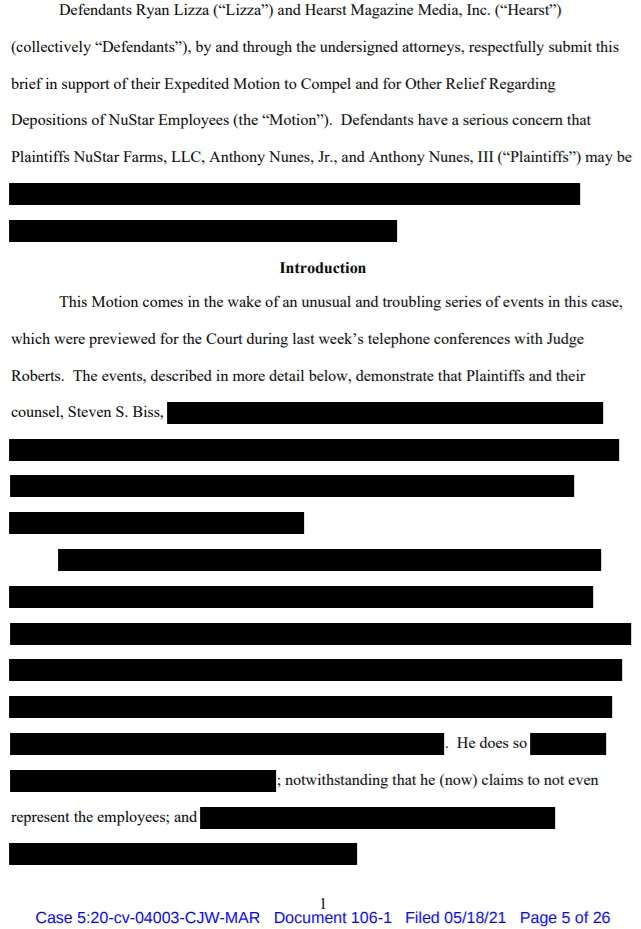The Volokh Conspiracy
Mostly law professors | Sometimes contrarian | Often libertarian | Always independent
Trying to Intervene to Unseal Filings in Rep. Devin Nunes's Libel Litigation Against Ryan Lizza and Esquire
I filed the motion last week, and thought I'd pass along the Introduction:
In this case, the Ranking Member of the House Intelligence Committee is suing a journalist for his reporting. Members of the public should be able to closely monitor the case and the arguments that this Court is considering in making its decisions.
Proposed intervenor Volokh is a professor at UCLA School of Law, and writes regularly at the Reason Magazine website (http://reason.com). Volokh has written about this case at Reason [citations omitted -EV]. To continue informing the public about this case, Volokh seeks access to the unredacted versions of Defendants' Brief in Support of Their Motion to Compel (Doc. 103), Plaintiffs' Resistance to that motion (Doc. 107), and what appears to be the Defendants' Reply (Doc. 111). Volokh therefore moves to intervene under Federal Rule of Civil Procedure 24(b) and access unredacted versions of those documents. (Volokh does not object to the continued deletion of the names and identities of third parties, such as unnamed sources or NuStar employees other than the plaintiffs, but will use "unredacted" as shorthand for versions that only have such personal material removed.)
[1.] Volokh is entitled to intervene, because Rule 24(b) intervention is the appropriate procedure for non-parties seeking access to judicial records in civil cases.
[2.] Volokh should get access to the unredacted documents, because plaintiffs have not overcome the common-law presumption favoring public access to judicial records.
[3.] Even if that common-law presumption does not apply to discovery motions, Volokh should get access to the unredacted documents because plaintiffs have failed to meet Rule 26(c)'s good-cause requirement.
[4.] Volokh is further entitled to access the unredacted documents because they have not been properly filed under seal, given that the parties apparently did not comply with Local Rule 5(c) and with the Electronic Case Filing Procedures for the United States District Court for the Northern District of Iowa.
[5.] Volokh should also gain access to the documents under the First Amendment right of access to judicial records.
Here's a sample redacted page:

For more on the particular dispute to which this relates, see this post; for more on the case, see this decision dismissing the first Amended Complaint, and see also the Second Amended Complaint, which is the basis for the current phase of the litigation. Thanks to my student Branden Nikka, who worked on the case.
Editor's Note: We invite comments and request that they be civil and on-topic. We do not moderate or assume any responsibility for comments, which are owned by the readers who post them. Comments do not represent the views of Reason.com or Reason Foundation. We reserve the right to delete any comment for any reason at any time. Comments may only be edited within 5 minutes of posting. Report abuses.
Please to post comments


Useful template. I may use it to request the stonewalled records of the local Equity Curriculum, falsely scapegoating kindergarten children for racial disparities. I am facing $1000 fines for failure to report emotional child abuse, yet will be asked for facts by Democrat child welfare authorities. They have refused to investigate this matter themselves, without names, addresses of specific harmed children.
Sounds like there is some pretty interesting stuff behind the black marks. Let's hope your motion is granted.
Question: Who is responsible for the redactions? The Plaintiffs? The Defendants? The Court/Judge? And are redactions like this common?
This, from EV's motion :
<i<Volokh should get access to the unredacted documents, because plaintiffs have not overcome the common-law presumption favoring public access to judicial records.
implies that it is the plaintiffs who resist the unredaction of the redactions.
Ok. That seems to imply what you think it implies.
But I'm confused. The District court judge dismissed the suit in its entirety with prejudice in Aug 2020. (https://storage.courtlistener.com/recap/gov.uscourts.iand.55763/gov.uscourts.iand.55763.53.0.pdf)
The redacted brief from the defendants is dated May 2021. Why are they filing briefs in a case that was dismissed many months ago?
Now that EV has posted the previously missing link, I see that there was a second complaint filed.
Which begs the question, how do you re-file a suit that has been dismissed with prejudice?
Ok, after a bit of reading the actual court documents, I realize there were two suits, one filed by Nunes himself, which was dismissed, and one filed by NuStar & Nunes' family. It's the second one that still breathes.
Apparently, the result may turn on whether they actually hired undocumented workers.
Good luck on this. Deven Nunes needs to face accountability.
At the end of the post: "or more on the case, see here." There is no link.
Whoops, sorry, fixed!